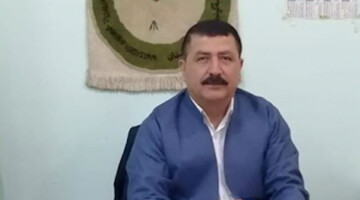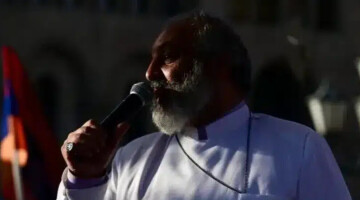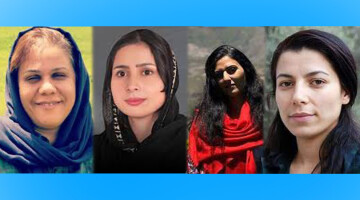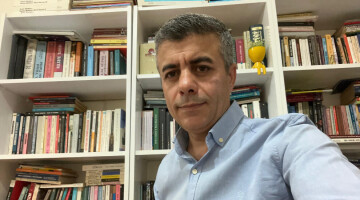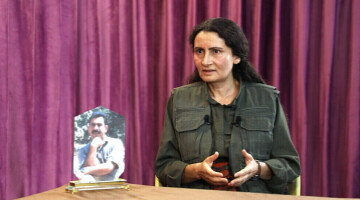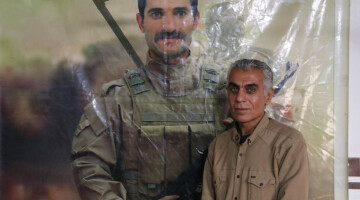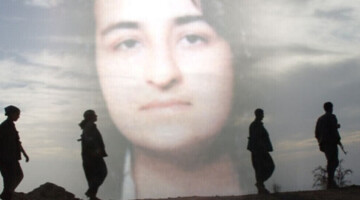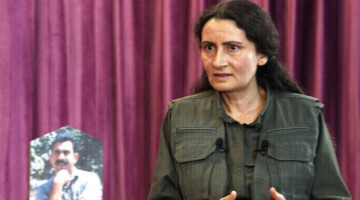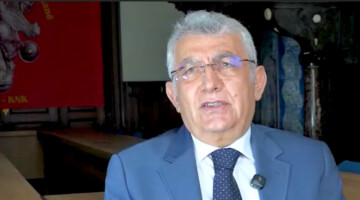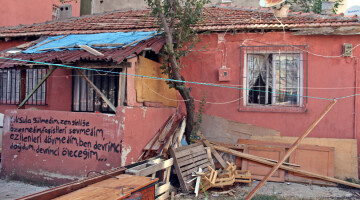The Turkish state led by the AKP, which took over Jarablus and aligned itself with Syria and Russia in order to prevent Kurds from forming a corridor and gaining a status in Syria, has been trying to hide its defeat in Bab where it has been stuck for months now. The Turkish army, which has received heavy casualties in Bab, is trying to increase its influence over the gang groups that are based in the area expanding from Jarablus to Idlib. It is placing 2300 soldiers and many gang members called FSA or local police in the military bases and checkpoints it has been constructing.
The Turkish army has activated its militarist presence outside Turkey in order to fortify the fundamentalist-racist coalition it has formed after the internal fighting that took place in the summer. It took actions in Iraq, South Kurdistan, Rojava and Syria, and placed its forces in Jarablus along with the gangs that it calls FSA, after its dissatisfaction from the proxy war it has been waging in Rojava and Syria. Jarablus was taken over without any clashes but was presented as a military victory. The Turkish army and its affiliate gangs also occupied Rai and Dabıq after the US, Russia and Iran gave their permission. Knowing that these would not prevent the formation of the Kurdish corridor, the Turkish army wrong-footed the US-led International Coalition as it attacked Bab and listed Manbij and Raqqa as its targets. However, this was not received well. Despite this, the Turkish army and affiliate gang groups reached the outskirts of Bab but were met with a strong resistance here.
WHY STUCK IN BAB?
A Turkish officer at NATO that was dismissed after the Turkish state’s recent internal fighting cites inside sources and explains why Turkish forces are stuck in Bab in the following way;
* Lack of intelligence. This is why artillery attacks are preferred. This approach is not selective and increased civilian and friendly-fire casualties.
* The Turkish army does not have sufficient land-to-air guided missiles. This is why Turkish officials carried out an official visit to South Korea in order to purchase PGM kits (Precision Guided Missiles). Turkish warplanes carry out random bombings due to this lack of missiles.
* The Turkish Chief of Staff was aware that ISIS has and effectively uses Anti-Tank Guided Missiles and should have planned accordingly.
* Terrain. ISIS uses the relatively flat and fluid terrain, moves freely and quickly, and therefore hunts down tanks and other armored vehicles. The timing of the operation is not conducive to the movement of armored vehicles. Reliable sources state that, unlike the statements of the Turkish Chief of Staff, the Turkish army has lost 54 tanks and armored vehicles until last week. Despite its conventional superiority, the army has not even cut off the logistical routes of ISIS.
* Another reality about the occupation (according to high-level trusted resources) is the lack of a Unified Strategic Operation Plan (OPLAN). Shortly, there is nobody that has all the information about the operation. What they call a plan is nothing but a few power-point presentations that have arrows and monthly time frames.
* According to official reports, Turkish Special Forces’ three-star commander Lieutenant General Aksakallı (Erdoğan’s man) is leading the operation from the base in Silopi. This small base is not unified and I personally know that it was established to coordinate the units in Iraq with the Peshmerga.
* It is easy to see that the choice of a special forces commander that has no experience in a war of armored vehicles is not a smart choice when you examine the number of such vehicles used in the operation. The tanks that were lost during the clashes are proof of the much-needed common sense. I have heard that Aksakallı filed a report that blames the Chief of the Army for the failure.
* Instead of admitting the deficiency, the Erdoğan regime is trying to hide its failure and claims that “The US is not helping Turkish troops.” The Prime Minister went so far to say “The others are not doing anything; we are the only fighting force.” What was this help that was supposed to take place? The US neither approved the operation plan nor promised any support regarding Bab.
* Turkish Air Forces is seen as the biggest of its kind in Europe. With its more than 250 war planes, it should be able to provide the necessary aerial support. Turkish Chief of Staff announced that 1141 ISIS targets have been hit with 1233 guided missiles so far, but these attacks have not decreased ISIS war capabilities. So, either the air strikes are ineffective or these numbers are inaccurate.
* The Turkish army entered Syria without an identified target or plan. The “at best” method failed at the first real resistance. In the Bab operation, we can observe the failures of adventurism fueled by political ambitions as well as a military force with an inapt command structure. Will “the hunger for success” continue during the referendum process? This will be determined by a military victory or defeat.
The Turkish army has not entered Bab despite its attacks. Let alone Bab, they have not even entered Biza; the village of one of their commanders. They entered Biza after heavy bombardments that lasted 20 days, but could stay there only for two hours. ISIS retook Biza from the Turkish army and affiliate gang groups right before sunset. It even captured more than ten Turkish gang members. Due to its casualties in Bab, the Turkish army requested the intervention of the Ba’athist regime from Russia. Turkish, Russian and Syrian warplanes coordinated bombardment of Bab proves this coordination.
BA’ATHIST REGIME CUTS ISIS’ LAST SUPPLY ROUTE
The Ba’athist regime took another town near Bab under its control yesterday afternoon. Regime forces captured the town of Ayashiya to the southeast of Bab. With the capture of Ayashiya and the nearby hill, the last supply route to Bab was cut as it entered the fire range of regime forces. Thus, regime forces besieged Bab from the south and paved the way for entering the town.
TURKISH STATE IS BUILDING MILITARY BASES
The Turkish state attacked Manbij as soon as it entered Jarablus. It stopped its attacks after the intervention of the US, but never gave up on its intention to attack Manbij. It built a military zone in Helvancı village to the south of Jarablus; right across Manbij. It also built another base in Amarni village, which is the base of gang groups. In December, Turkey built a helicopter landing field in Helvancı village. It finished the construction of this field last week. It also built bases in Tashlı and Hava villages to the west of Jarablus. These two villages are located between Rai and Jarablus. Turkey stopped the construction of another base, that would be in Exterin and target Efrîn, after the bombardment of Syrian warplanes.
Construction of bases were accelerated after the Astana meeting and continued in the villages of Shava, Sheverin and Sindi between Rai and Azaz and Tıl Cibrin village between Azaz and Exterin. Over the past week, it built another helicopter landing field in a region between Dabıq and Ershab village. Turkish army officials flew to the hospital in Azaz also over the past week in order to monitor the transformation of the hospital to a military base. 6 million dollars have been allocated to transform this hospital to a base.
80 special forces members, 5 tanks and 2 panzers were sent to the Tıl Cibrin military base between Ayn Dekne village and Exterin. Ayn Dekne village is controlled by Jaysh al Thuwar; a constituent of the SDF. Gang groups affiliated with Turkey have attacked the village many times since last summer. The goal of the military base built in Tıl Cibrin is clearly Ayn Dekne, Tıl Rıfat, Sheikh Isa, Hesiye and other areas controlled by Jaysh al Thuwar. After the soldiers and vehicles sent to Tıl Cibrin, 2300 Turkish soldiers entered Syria through Azaz and Rai, and will be place in Dabıq, Soran, Şava, Şevrin, Sindi and Azaz.
Local sources stated that the placement of Turkish soldiers in these places is the preparation for a comprehensive attack on Efrîn and Shehba in the near future.
IS RUSSIA UNAWARE OF THIS?
These developments show that Turkey, who will have to accept its defeat and leave Bab to the regime, is implementing a plan targeting Efrîn and Shehba. It is impossible for Turkey to undertake these steps without the knowledge or approval of Russia.

